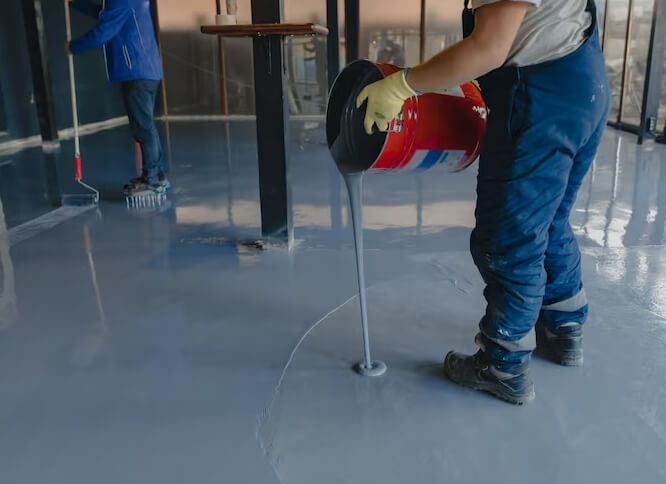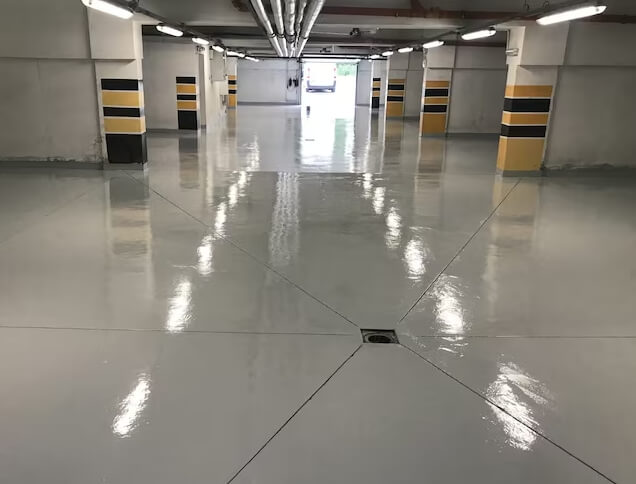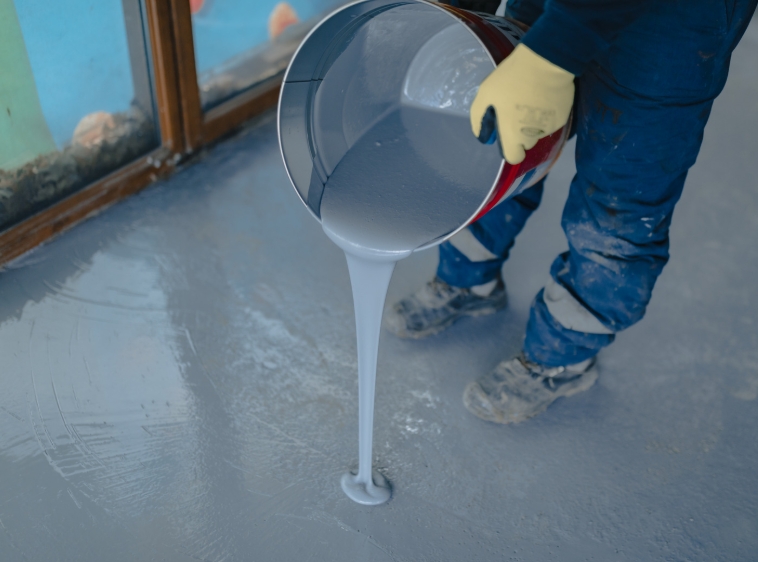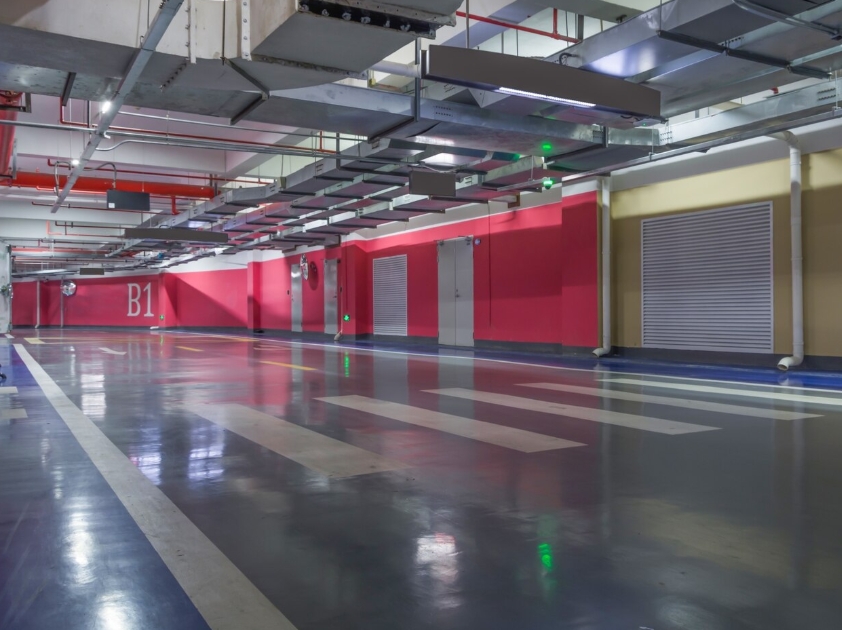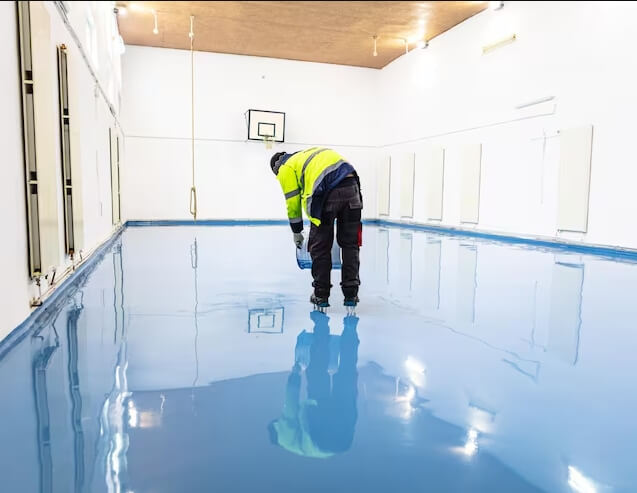
Must Know About Epoxy Floor Coating for Homes
Flooring plays a crucial role in a home, influencing both aesthetics and functionality. While timber, tiles, and vinyl remain popular, modern homeowners are increasingly turning to epoxy floor coatings. Originally used in industrial settings, epoxy flooring has now gained popularity in residential spaces due to its durability, style, and ease of maintenance.
Whether it’s a garage that withstands daily wear, a kitchen that remains clean and hygienic, or a basement that is transformed into a polished living area, epoxy flooring provides a long-lasting, seamless solution.
What is Epoxy Floor Coating?
Epoxy flooring is created by mixing epoxy resin with a hardener, which chemically bonds with the concrete surface to form a durable, glossy, and seamless layer. Unlike traditional flooring, epoxy is non-porous, which prevents liquids, dirt, and dust from penetrating, making cleaning effortless.
Epoxy flooring is also highly customizable. Homeowners can choose from metallic, flake, clear, or solid-color finishes to match their interior design. Its reflective surface enhances natural and artificial lighting, making rooms appear brighter and more spacious.
Why Epoxy Flooring is Perfect for Homes
Epoxy flooring combines strength, beauty, and low maintenance, making it ideal for residential use. Some of the main advantages include:
-
Durability: Epoxy floors can withstand heavy foot traffic, furniture movement, and occasional impact from dropped objects. With professional installation, floors can last 10–20 years.
-
Low Maintenance: Unlike tiles or wood, epoxy requires only sweeping or mopping. Spills are easily wiped up without staining the surface.
-
Water and Stain Resistance: Epoxy seals the concrete, protecting it from water, oils, and household chemicals. Ideal for kitchens, bathrooms, and laundry areas.
-
Aesthetic Flexibility: Epoxy can mimic marble, polished concrete, or stone. Decorative finishes like metallic or flake designs can transform ordinary spaces into modern, luxurious areas.
-
Slip Resistance: Additives can create a safe, anti-slip surface suitable for children and pets.
-
Eco-Friendly: Many modern epoxy products are low-VOC, and applying epoxy over existing concrete reduces waste.
Common Areas for Epoxy Flooring in Homes
Epoxy flooring is versatile and can be installed in almost any residential space. For example, garages are the most common application due to their exposure to oil, tire marks, and heavy loads. A properly coated garage floor looks polished and professional while protecting the concrete beneath. Kitchens benefit from epoxy’s waterproof and hygienic properties, keeping the floor clean and resistant to spills. Bathrooms and laundries also enjoy a seamless, mold-resistant surface, which is easier to maintain than tiles.
Even living rooms, hallways, and basements can be transformed with epoxy. Decorative metallic or flake finishes provide style and elegance, while the durable surface withstands heavy furniture and foot traffic. Outdoor patios, verandas, and alfresco areas can also use UV-stable epoxy coatings, offering weather-resistant, long-lasting protection.
Types of Epoxy Flooring for Homes
There are several epoxy types suitable for residential applications. Choosing the right one depends on the area of application, traffic, and desired aesthetics.
-
Self-Leveling Epoxy:
-
Provides a smooth, seamless surface
-
Ideal for kitchens, garages, and living areas
-
Covers minor cracks and imperfections
-
-
Epoxy Flake Flooring:
-
Decorative flakes embedded in epoxy layers
-
Adds color, texture, and slip resistance
-
Commonly used in garages and outdoor spaces
-
-
Metallic Epoxy:
-
Uses metallic pigments to create reflective, marbled effects
-
Gives a luxurious, modern appearance
-
Suitable for living rooms, kitchens, or feature areas
-
-
Mortar Epoxy:
-
Combines epoxy with sand or quartz for added durability
-
Withstands heavy loads and mechanical impact
-
Perfect for home workshops, gyms, or garages
-
-
Clear Epoxy Coating:
-
Protects existing decorative concrete or tiles
-
Enhances natural colors and textures
-
Adds durability and a polished finish
-
Installation Process
Professional installation ensures the epoxy floor delivers maximum durability and aesthetic appeal. The process generally includes:
-
Surface Preparation: Concrete is cleaned and ground to remove dust, grease, and old coatings. This ensures strong adhesion.
-
Repair and Leveling: Cracks, holes, and uneven surfaces are repaired to create a smooth base.
-
Primer Application: Enhances bonding between epoxy and concrete, reducing the risk of peeling or bubbling.
-
Epoxy Coating Application: Resin and hardener are mixed and applied in layers. Decorative flakes or metallic pigments may be added for a personalized design.
-
Topcoat Sealing: A clear topcoat adds UV protection, chemical resistance, and durability.
-
Curing: Floors typically cure for 24–72 hours before being used, depending on environmental conditions.
The professional approach ensures a flawless finish that DIY methods often fail to achieve, preventing common issues like bubbling, peeling, or uneven surfaces.
Maintenance Tips
Even though epoxy floors are low-maintenance, following simple care routines will help them last longer:
-
Sweep or vacuum regularly to remove dust and debris
-
Mop with warm water and mild detergent
-
Wipe spills immediately to prevent potential stains
-
Use furniture pads to avoid scratches from heavy objects
-
Consider professional recoating every 5–10 years to restore shine and durability
Addressing Common Concerns
Many homeowners hesitate to install epoxy due to misconceptions:
-
Slippery Surface: Anti-slip additives ensure safety in wet areas.
-
Only Suitable for Garages: Modern epoxy is ideal for kitchens, living areas, basements, and patios.
-
High Cost: While initial investment is higher, epoxy flooring is cost-effective in the long term due to durability and low maintenance.
-
Difficult to Maintain: Epoxy is easier to clean than tiles or wood and resists staining and moisture.
Why Hire a Professional Installer
Professional installers bring experience, precision, and quality materials to every project. They ensure:
-
Proper surface preparation for strong adhesion
-
Accurate mixing ratios for consistent performance
-
Even application and smooth finish
-
Design customization with flakes or metallic effects
-
Long-term warranty and aftercare support
DIY kits are available, but without proper technique, the floor may develop bubbling, uneven surfaces, or peeling, significantly reducing its lifespan.
Final Thoughts
Epoxy floor coating is a modern, versatile, and durable flooring solution for residential properties. It offers a combination of beauty, functionality, and longevity that is hard to match with traditional flooring options. From garages and kitchens to living rooms, basements, and patios, epoxy transforms ordinary floors into seamless, stylish, and low-maintenance surfaces. Professional installation ensures long-lasting results, allowing homeowners to enjoy both aesthetics and durability for years.

